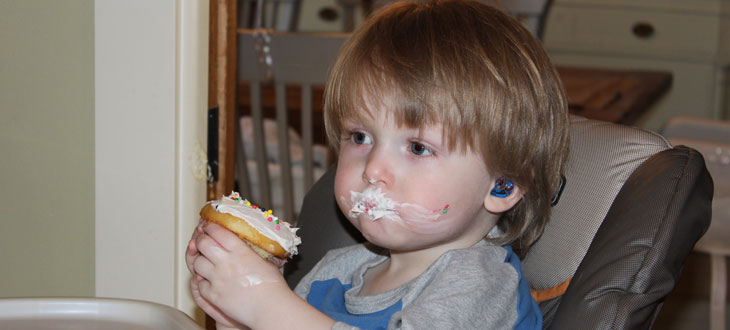Summer is in full effect! And swimmer's ear is serious concern... What is it you may wonder? Swimmer’s ear is an infection found in the outer ear canal, the area that extends from the outer ear (pinna) to the eardrum (tympanic membrane). The medical term for swimmer’s ear is otitis externa. Swimmer’s ear occurs when moisture gets trapped in the outer ear space, creating the perfect breeding ground for bacterial growth, which can invade the skin of the ear canal.
Causes of swimmer’s ear
Swimmer’s ear is most often caused by moisture or debris retained in the ear canal from swimming, showering, bathing or other moist environments. Swimmer’s ear should be taken seriously, and should be treated to prevent any negative effects it may have on your hearing and to prevent further infection.Other factors that contribute to swimmer’s ear
Exposure to excessive bacteria, often found in hot tubs or polluted water.
Excessive cleaning of the ear canal with cotton swabs (or any other tool that can damage the skin)!
Cuts or skin conditions in the ear canal (eczema, seborrhea, etc.) that create an opening for bacteria to penetrate the skin.
Contact with chemicals such as hair spray or hair dye that migrate into the ear canal.
Symptoms of swimmer’s ear
Mild cases of swimmer’s ear will likely begin by itching and irritation in the ear canal and pain that worsens when you tug on the outer ear (pinna). The ear may feel swollen or blocked. A clear, odorless discharge may be present as well.Advanced cases of swimmer’s ear may involve:
Fever
Decreased hearing
Intense pain that spreads to the neck, face or head
Redness and/or swelling of the skin around the ear
Drainage or discharge that has an odor
Swimmer’s ear is typically not considered to be a dangerous condition and can clear up quickly following treatment. However, if untreated, swimmer’s ear can become extremely painful and potentially dangerous, especially for those who are diabetic or have problems with their immune system, including the elderly.
Complications of swimmer’s ear
Left untreated, swimmer’s ear can lead to:
Hearing loss
Recurring ear infections (chronic otitis externa): Without treatment the infection can persist
Bone and cartilage damage: Untreated infections can spread to the base of the skull, brain or cranial nerves. (Diabetics and the elderly are at higher risk for this sort of complication.)
.
Swimmer’s ear treatment
Medical treatment is the standard course of treatment for swimmer’s ear.The physician will perform an otoscopic examination to confirm there is no eardrum perforation, which would allow moisture to invade the middle ear space. The physician may be able to easily clean the infected area to relieve irritation and pain. Antibiotic ear drops are necessary to clear the infection and will be prescribed by the physician. For a more advanced infection, oral antibiotics or pain medication may be prescribed as well. If the infection does not improve within 3-4 days, the physician may consider different medications.It is important to keep the infected ear(s) dry during the healing process.
How to help prevent swimmer’s ear
If you are prone to swimmer’s ear infections, it can be wise to take some preventative measures. These include:
Dry the ears following water exposure, especially swimming. Tip your head to one side to let the water drain out, then repeat on the other side. Never use cotton swabs to dry the ear! A dry towel or tissue can be used as well.
Keep water out of the ear. This may be accomplished by using a barrier such as earplugs. These can be found as over-the-counter products but are most effective when custom molded by a hearing professional for the patients’ ears.
Maintain proper earwax hygiene. Earwax or cerumen plays an important role in protecting the outer ear canal. Too much or too little cerumen can be an issue. Improper ear cleaning methods such as cotton swabs or ear candling can lead to ear canal damage that can lead to infection.
Maintain proper skin health. The skin in the ear canal plays a big role in prevention of swimmer’s ear. Dry, cracked skin (often the result of health conditions) can be an open invitation to infection.
Protect your ears from chemicals. Keep chemicals from hair spray and dye out of the ear canal with cotton balls or earplugs.
Consider ear drops. There are over-the-counter ear drops designed to help prevent swimmer’s ear. It is important that you DO NOT put anything in your ear canal if there is any risk of you having a perforation of the eardrum. Seeing a physician to verify the integrity of the eardrum is strongly advised.
You can always contact South Suburban Hearing Health Center if you'd like to learn more!












 I’ve been there before, lip reading, cupping my ears, ensuring I sit as close to the front row (or in it) as possible. Nodding my head and smiling. Laughing because others are laughing.Coping strategies and pretending to hear often go together, and like me, you’ve probably employed them when you weren’t sure what hearing aids can do for you. Well, I’ve spent the last three years of my life thriving with hearing aids, and I can now look back at these coping strategies and define all but one as “ineffectual.”Let’s start with the one coping strategy that can be helpful first.
I’ve been there before, lip reading, cupping my ears, ensuring I sit as close to the front row (or in it) as possible. Nodding my head and smiling. Laughing because others are laughing.Coping strategies and pretending to hear often go together, and like me, you’ve probably employed them when you weren’t sure what hearing aids can do for you. Well, I’ve spent the last three years of my life thriving with hearing aids, and I can now look back at these coping strategies and define all but one as “ineffectual.”Let’s start with the one coping strategy that can be helpful first.
 In a 2015 study that investigated the association between hearing loss and mortality, researchers from Johns Hopkins University found that adults 70 years and older with moderate or severe hearing loss had a 54% increased risk of mortality compared to peers without hearing loss.Researchers studied data from two National Health and Nutrition Examination Surveys — the 2005 through 2006 one, and 2009 through 2010 — examining 1,666 adults 70+ who had undergone audiometric testing. Those with hearing loss tended to have shorter lifespans.While the study’s leads were clear to note the results didn’t prove that hearing loss, alone, shortens lives, they did point out the many negative effects of hearing loss (
In a 2015 study that investigated the association between hearing loss and mortality, researchers from Johns Hopkins University found that adults 70 years and older with moderate or severe hearing loss had a 54% increased risk of mortality compared to peers without hearing loss.Researchers studied data from two National Health and Nutrition Examination Surveys — the 2005 through 2006 one, and 2009 through 2010 — examining 1,666 adults 70+ who had undergone audiometric testing. Those with hearing loss tended to have shorter lifespans.While the study’s leads were clear to note the results didn’t prove that hearing loss, alone, shortens lives, they did point out the many negative effects of hearing loss (
 Today on our blog, we’re excited to share Frankie’s story. Ready to start first grade, he was recently fit with a new Starkey Behind-the-Ear hearing aid. His mom sat down with us to talk about his hearing journey.Frankie’s Mom: We were told that our son did not pass his hearing screening at the hospital when he was just a few days old. The doctors assured us that it was normal not to pass, explaining he may still have fluid in his ears from the placenta. We went back for follow-up testing when he was 3 months old. The test confirmed that he did have hearing loss in his left ear. In fact, it was moderately severe.I remember going to that follow-up appointment feeling optimistic, but I left a crying mess. Learning Frankie had moderately severe hearing loss felt like someone punched me in the stomach. I worried that he would be teased for wearing a hearing aid and that he would fall behind his peers academically. I worried about him feeling different than his twin brother. I remember thinking that I had done something to cause his hearing loss during my pregnancy. I started to blame myself. I was just really scared.When Frankie was almost four months old, we took him to the Mayo Clinic in Rochester, Minnesota for further diagnostic testing. After imaging, his doctors confirmed he had Large Aqua Duct Syndrome, which affected the hearing in his left ear. The doctor said this condition usually presents itself with hearing loss in both ears. We felt fortunate that in Frankie’s case, Large Aqua Duct Syndrome only effected the hearing in his left ear.SHT: Tell us a little bit about his first hearing aid fitting.Frankie’s Mom: You can see [below] that my husband chose MN Vikings colors for his little guy. In the picture, he is working with the occupational therapist through our school district. The therapist would bring different toys and tools to help Frankie progress in areas that would help his development continue. I really feel that getting him fit at a young age helped him accept his hearing loss and normalized wearing a hearing aid for him.
Today on our blog, we’re excited to share Frankie’s story. Ready to start first grade, he was recently fit with a new Starkey Behind-the-Ear hearing aid. His mom sat down with us to talk about his hearing journey.Frankie’s Mom: We were told that our son did not pass his hearing screening at the hospital when he was just a few days old. The doctors assured us that it was normal not to pass, explaining he may still have fluid in his ears from the placenta. We went back for follow-up testing when he was 3 months old. The test confirmed that he did have hearing loss in his left ear. In fact, it was moderately severe.I remember going to that follow-up appointment feeling optimistic, but I left a crying mess. Learning Frankie had moderately severe hearing loss felt like someone punched me in the stomach. I worried that he would be teased for wearing a hearing aid and that he would fall behind his peers academically. I worried about him feeling different than his twin brother. I remember thinking that I had done something to cause his hearing loss during my pregnancy. I started to blame myself. I was just really scared.When Frankie was almost four months old, we took him to the Mayo Clinic in Rochester, Minnesota for further diagnostic testing. After imaging, his doctors confirmed he had Large Aqua Duct Syndrome, which affected the hearing in his left ear. The doctor said this condition usually presents itself with hearing loss in both ears. We felt fortunate that in Frankie’s case, Large Aqua Duct Syndrome only effected the hearing in his left ear.SHT: Tell us a little bit about his first hearing aid fitting.Frankie’s Mom: You can see [below] that my husband chose MN Vikings colors for his little guy. In the picture, he is working with the occupational therapist through our school district. The therapist would bring different toys and tools to help Frankie progress in areas that would help his development continue. I really feel that getting him fit at a young age helped him accept his hearing loss and normalized wearing a hearing aid for him. Now, when Frankie needs a new hearing aid, he looks forward to the fitting because he loves to pick the color of his ear mold. I love watching him, and it's not always the color I would choose, but I make him feel like it was the best choice in the world.SHT: What advice would you give other parents pursuing hearing healthcare for their child?Frankie’s Mom: It is such a shock to hear a diagnosis that your child has hearing loss. For one, it opens up the fear of the unknown. And two, you just want to fix everything for these little people that you love so unconditionally. For me, timing was everything: I really had to wrap my brain around the reality. Once I did, it was smooth sailing.Find a professional that gels well with your child. And before they start school, call your school district to see if they have professionals set aside to help your child. Then, just take one day at a time. There are amazing books about hearing loss at your public library that can teach your child to be advocates for themselves. Also, there are support groups for parents who are in the same boat.I think the sooner you treat the hearing loss, the sooner it becomes "their normal" and they learn to advocate for themselves. Also, we were told it is very important for the nerves in the ear to be stimulated, so the sooner your child is fit the better.
Now, when Frankie needs a new hearing aid, he looks forward to the fitting because he loves to pick the color of his ear mold. I love watching him, and it's not always the color I would choose, but I make him feel like it was the best choice in the world.SHT: What advice would you give other parents pursuing hearing healthcare for their child?Frankie’s Mom: It is such a shock to hear a diagnosis that your child has hearing loss. For one, it opens up the fear of the unknown. And two, you just want to fix everything for these little people that you love so unconditionally. For me, timing was everything: I really had to wrap my brain around the reality. Once I did, it was smooth sailing.Find a professional that gels well with your child. And before they start school, call your school district to see if they have professionals set aside to help your child. Then, just take one day at a time. There are amazing books about hearing loss at your public library that can teach your child to be advocates for themselves. Also, there are support groups for parents who are in the same boat.I think the sooner you treat the hearing loss, the sooner it becomes "their normal" and they learn to advocate for themselves. Also, we were told it is very important for the nerves in the ear to be stimulated, so the sooner your child is fit the better. SHT: What do Frankie’s friends think about his hearing aid?Frankie’s Mom: The deaf and hard-of-hearing teacher in his school district gave Frankie's kindergarten teacher a book about hearing loss to read to the class. The teacher said it was the most attentive the kids had been all year! They were so eager to hear about this super cool device that is in Frankie's ear, and learn all about it, what it is and what it does. Frankie felt pretty cool after that.When his classmates want to touch his hearing aid, he knows to tell them, "You can look, but I am the only one who can touch it." He understands that his hearing loss is something that he will have for the rest of his life, which is hard to comprehend at six years of age. When kids at school ask, "why do you have that in your ear?" Frankie says, "My ear needs extra help to hear."SHT: Do you talk about your son’s hearing loss openly or do most people not notice his hearing aid?Frankie’s Mom: We are so open about talking about his hearing loss because I think the vulnerable areas of your life provide the most connections with others. Frankie's support team is so good at teaching him to advocate for himself. For example, in school, Frankie gets to sit right next to the teacher in circle time, with his good ear facing the teacher. He feels SO special because of this, and knows that is his seat. His twin brother has had huge fits about wanting to wear a hearing aid because he thinks it’s so cool.Frankie loves to build with his Magformers and Legos. From an early age, this has always been a passion for him and he makes the most amazing creations, usually all from his imagination. He loves to play soccer, t-ball, skate and swim. I always make sure I tell the coaches about his hearing loss so they are aware that they might need to speak louder or make direct eye contact with him.In school, he has been great at wearing the hearing aid, but when he is done for the day or needs a break, I let him take it out. We make sure to tell him he always needs to hand it to us right away, so we can keep it in a special place when he is not using it.
SHT: What do Frankie’s friends think about his hearing aid?Frankie’s Mom: The deaf and hard-of-hearing teacher in his school district gave Frankie's kindergarten teacher a book about hearing loss to read to the class. The teacher said it was the most attentive the kids had been all year! They were so eager to hear about this super cool device that is in Frankie's ear, and learn all about it, what it is and what it does. Frankie felt pretty cool after that.When his classmates want to touch his hearing aid, he knows to tell them, "You can look, but I am the only one who can touch it." He understands that his hearing loss is something that he will have for the rest of his life, which is hard to comprehend at six years of age. When kids at school ask, "why do you have that in your ear?" Frankie says, "My ear needs extra help to hear."SHT: Do you talk about your son’s hearing loss openly or do most people not notice his hearing aid?Frankie’s Mom: We are so open about talking about his hearing loss because I think the vulnerable areas of your life provide the most connections with others. Frankie's support team is so good at teaching him to advocate for himself. For example, in school, Frankie gets to sit right next to the teacher in circle time, with his good ear facing the teacher. He feels SO special because of this, and knows that is his seat. His twin brother has had huge fits about wanting to wear a hearing aid because he thinks it’s so cool.Frankie loves to build with his Magformers and Legos. From an early age, this has always been a passion for him and he makes the most amazing creations, usually all from his imagination. He loves to play soccer, t-ball, skate and swim. I always make sure I tell the coaches about his hearing loss so they are aware that they might need to speak louder or make direct eye contact with him.In school, he has been great at wearing the hearing aid, but when he is done for the day or needs a break, I let him take it out. We make sure to tell him he always needs to hand it to us right away, so we can keep it in a special place when he is not using it. SHT: Tell us about his recent fitting with Starkey hearing aidsFrankie’s Mom: His audiologist recommended that we try a new hearing aid, made by a different manufacturer. She tested Frankie’s hearing with a few different brands to see which one would work best for Frankie. It was important for us to find a hearing aid that helped him understand speech in his aided ear, because his word recognition in that ear is only eight percent.He understood speech the best with the Starkey hearing aid. His audiologist allowed us to try it for a few months. After the trial period, she tested his understanding of words with the Starkey hearing aid and he improved to 56%! We couldn’t believe it.I always knew that word recognition — or speech understanding — was hard when his good ear was covered and he had to rely solely on his ear with the hearing loss. That’s why we are so excited that his speech understanding in his aided ear improved so much after he was fit.SHT: Anything else you’d like to share?Frankie’s Mom: Learning how to handle his hearing loss has been such an amazing discovery for myself and for my son. I am grateful that his hearing aid has helped him do well in kindergarten and socialize with his friends. He has enjoyed his summer and I can't wait to see what amazing things lie ahead for my son this year school as he enters first grade.We love stories like this!
SHT: Tell us about his recent fitting with Starkey hearing aidsFrankie’s Mom: His audiologist recommended that we try a new hearing aid, made by a different manufacturer. She tested Frankie’s hearing with a few different brands to see which one would work best for Frankie. It was important for us to find a hearing aid that helped him understand speech in his aided ear, because his word recognition in that ear is only eight percent.He understood speech the best with the Starkey hearing aid. His audiologist allowed us to try it for a few months. After the trial period, she tested his understanding of words with the Starkey hearing aid and he improved to 56%! We couldn’t believe it.I always knew that word recognition — or speech understanding — was hard when his good ear was covered and he had to rely solely on his ear with the hearing loss. That’s why we are so excited that his speech understanding in his aided ear improved so much after he was fit.SHT: Anything else you’d like to share?Frankie’s Mom: Learning how to handle his hearing loss has been such an amazing discovery for myself and for my son. I am grateful that his hearing aid has helped him do well in kindergarten and socialize with his friends. He has enjoyed his summer and I can't wait to see what amazing things lie ahead for my son this year school as he enters first grade.We love stories like this!  Starkey Hearing Technologies is excited to announce a new line of hearing aids based on cutting-edge research in virtual reality, advanced neuroscience, and signal processing. This new line — called iQ — is designed to create a truly immersive hearing experience for wearers, one that delivers the presence, clarity and personalization wearers may have previously missed during the moments that matter most.Our new iQ lineup includes
Starkey Hearing Technologies is excited to announce a new line of hearing aids based on cutting-edge research in virtual reality, advanced neuroscience, and signal processing. This new line — called iQ — is designed to create a truly immersive hearing experience for wearers, one that delivers the presence, clarity and personalization wearers may have previously missed during the moments that matter most.Our new iQ lineup includes 

 If you have
If you have 
 Recently, writers David Owen and Lloyd Alter chronicled their experiences with hearing loss and their Starkey hearing aids for The New Yorker and Mother Nature Network (MNN), respectively.In The New Yorker piece, titled “
Recently, writers David Owen and Lloyd Alter chronicled their experiences with hearing loss and their Starkey hearing aids for The New Yorker and Mother Nature Network (MNN), respectively.In The New Yorker piece, titled “